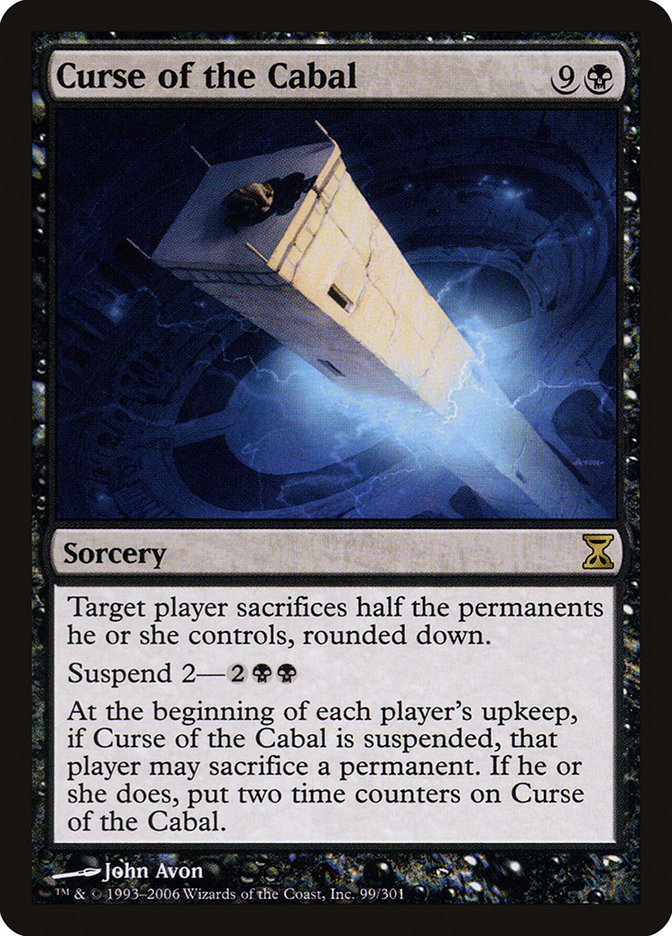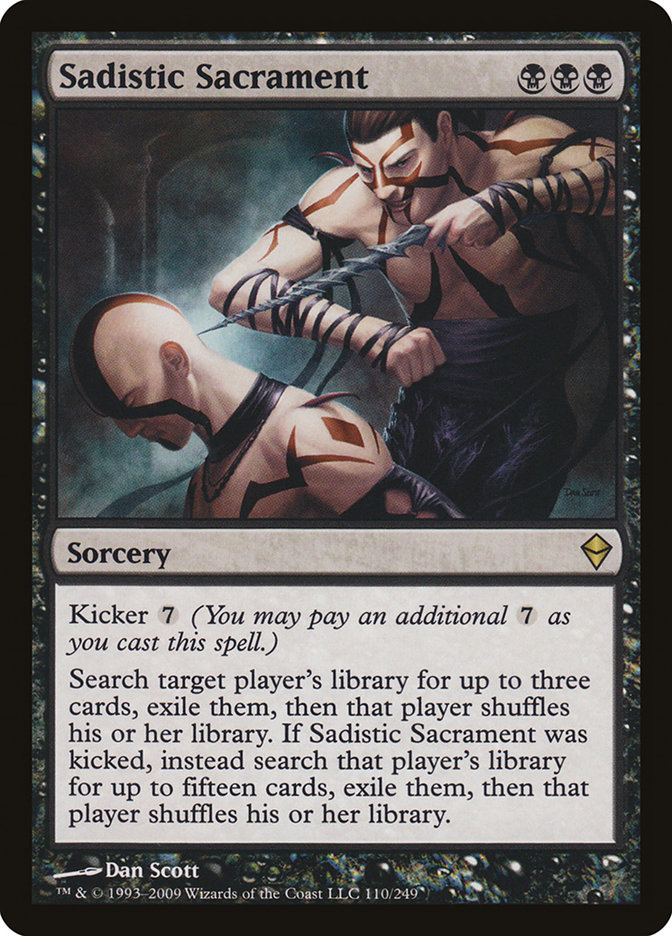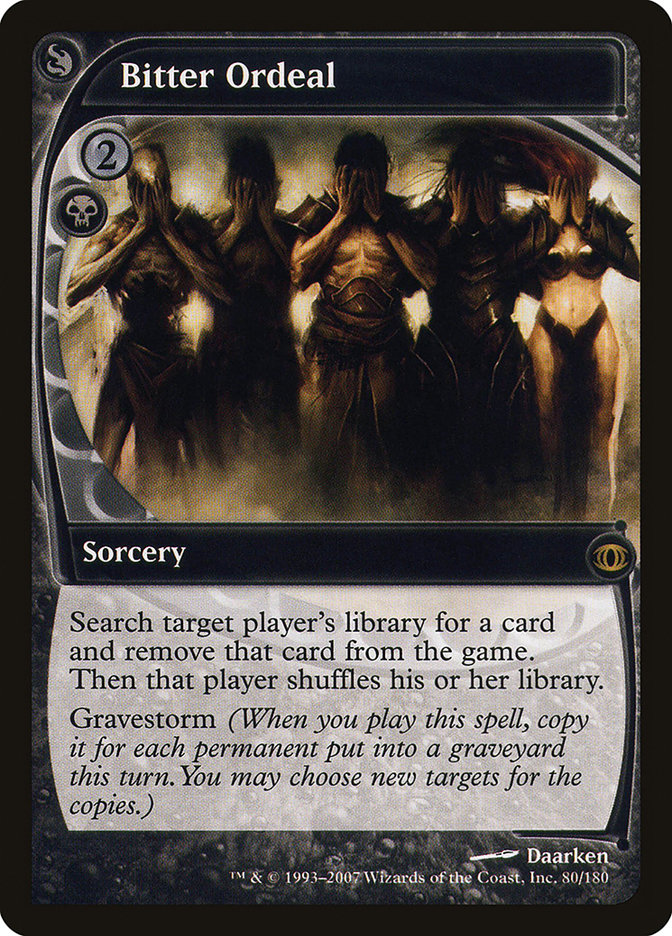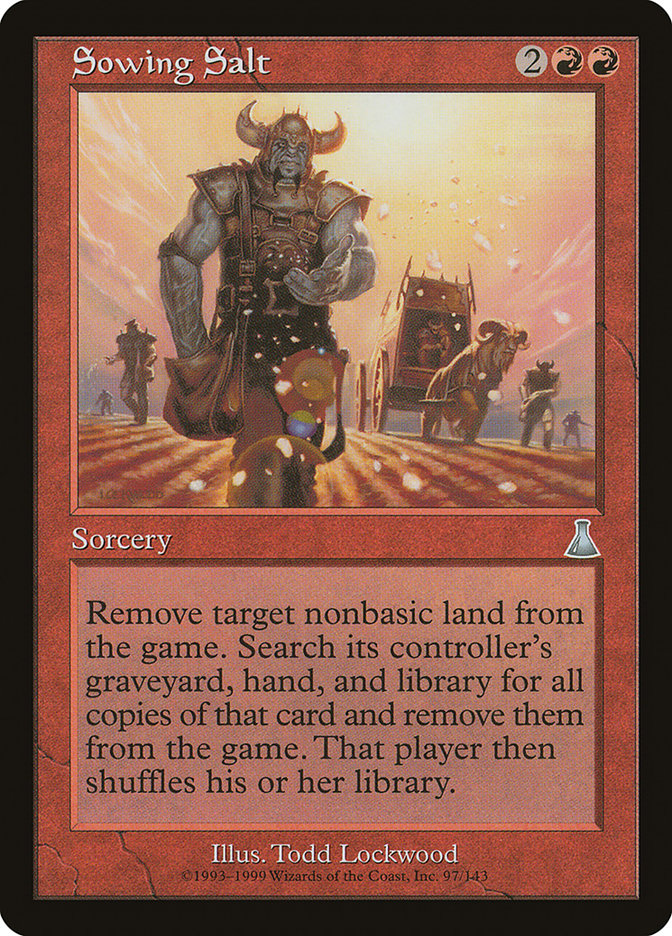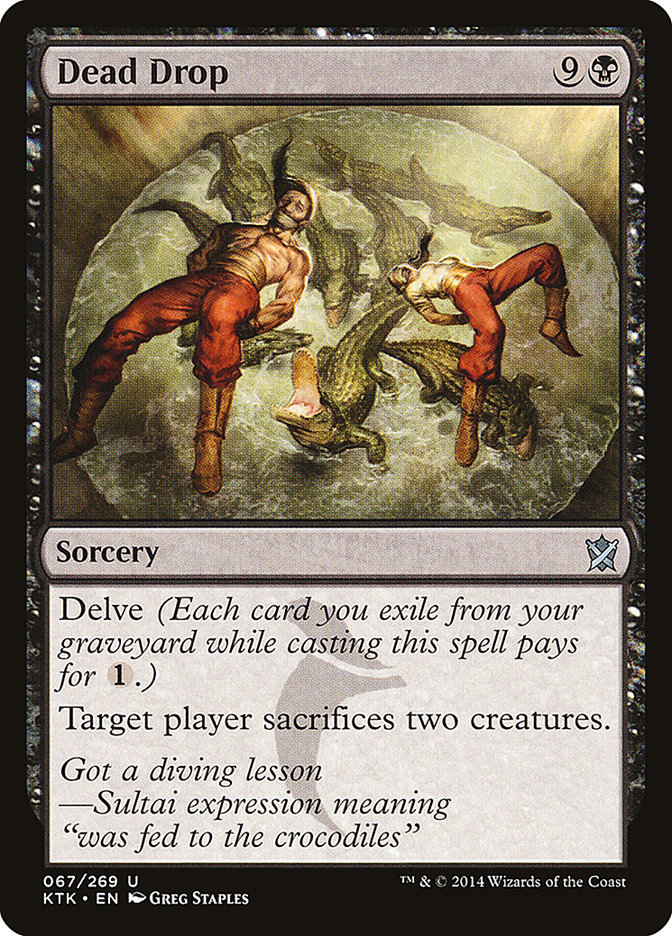Curse of the Cabal MTG Card
| Mana cost | |
| Converted mana cost | 10 |
| Rarity | Rare |
| Type | Sorcery |
| Abilities | Suspend |
| Released | 2006-10-06 |
| Set symbol | |
| Set name | Time Spiral |
| Set code | TSP |
| Number | 99 |
| Frame | 2003 |
| Layout | Normal |
| Border | Black |
| Illustred by | John Avon |
Text of card
Target player sacrifices half the permanents he or she controls, rounded down. Suspend 2— At the beginning of each player's upkeep, if Curse of the Cabal is suspended, that player may sacrifice a permanent. If he or she does, put two time counters on Curse of the Cabal.
Cards like Curse of the Cabal
Curse of the Cabal is a unique card that has intrigued many players of Magic: The Gathering with its potentially game-altering effect. Resembling cards like Sadistic Sacrament in its ability to disrupt an opponent’s strategy, Curse of the Cabal takes it a step further by threatening an ongoing sacrifice unless interrupted. Unlike Sadistic Sacrament, which offers a one-time extraction of key cards from an opponent’s deck, Curse of the Cabal’s suspense builds with each of your turns as the game progresses.
Another related spell is Bitter Ordeal, which also delves into the realm of graveyards, allowing for the removal of multiple cards at once. While Bitter Ordeal relies on the gravestorm mechanic, gaining power as more cards are put into graveyards, Curse of the Cabal can become a recurring dilemma. Meanwhile, Sowing Salt offers a more direct approach, exiling targeted cards from a player’s deck and graveyard without suspense but offering no ongoing threat.
Analyzing Curse of the Cabal alongside its counterparts, its prolonged and strategic contribution to the gameplay stands out in the landscape of disruption cards in Magic: The Gathering, asserting its value through potential board control and psychological impact.
Cards similar to Curse of the Cabal by color, type and mana cost
Card Pros
Card Advantage: Curse of the Cabal is known for disrupting opponents by forcing them to sacrifice permanent cards. This creates a substantial card advantage as you’re systematically diminishing your opponent’s resources without directly expending your cards.
Resource Acceleration: Although not a direct tool for resource acceleration, by putting pressure on opponents to act or lose key resources, Curse of the Cabal can indirectly accelerate your position as the dominant player, effectively making your future plays more impactful.
Instant Speed: While not an instant itself, Curse of the Cabal can be synergized with other cards that have instant speed capabilities. Combining it with cards that allow for instant speed interaction, you can time your plays with Curse of the Cabal to coincide with your instant speed plays, catching your opponent at their most vulnerable and compounding the pressure.
Card Cons
Specific Mana Cost: Curse of the Cabal requires a substantial amount of black mana, requiring two black and eight generic, which can be a heavy investment and limit the card’s flexibility across various deck types.
Comparatively High Mana Cost: With a ten mana overall cost, Curse of the Cabal is one of the more expensive spells to cast. This can be particularly challenging since it competes with other high-impact cards that could be played sooner or have an immediate effect on the game state.
Discard Requirement: Although this card does not have a direct discard requirement, it does give opponents the option to sacrifice permanents to delay its devastating effect. This choice can indirectly force you to discard valuable resources in an attempt to counteract or mitigate the sacrifices your opponent chooses to make.
Reasons to Include in Your Collection
Versatility: Curse of the Cabal offers a dynamic approach to deck building, with its ability to disrupt opponent’s strategies whether you opt to suspend it or cast it outright. It can be a game-changer in control or stax-type decks that aim to restrict the opponent’s plays.
Combo Potential: This sorcery shines in decks that exploit time counters or sacrifice mechanics. It can also be part of a combo that forces an opponent to sacrifice crucial permanents, tipping the scales in your favor.
Meta-Relevance: As the game evolves, so do the decks that dominate play. Curse of the Cabal has the power to shake up the meta by challenging popular decks that rely heavily on specific permanents, making it a potential sideboard candidate to outsmart your competition.
How to beat
Curse of the Cabal is a powerful sorcery card that looms over the game, setting a clock on your opponent’s resources. The card’s suspenseful nature, with its countdown mechanic, can pressure adversaries into making difficult decisions. When faced with the eminent sacrifice of permanents, the key to overcoming this daunting card lies in strategic foresight and resource management.
One effective strategy is to maintain a reserve of expendable permanents, ensuring you have less valuable assets to sacrifice when Curse of the Cabal’s time counter is removed. Moreover, incorporating cards that can counteract or remove enchantments and sorceries directly from the stack will give you a fighting chance against this high-stakes card. Lastly, increasing the speed of your deck to apply pressure and reduce your opponent’s window to maximize Curse of the Cabal’s potential can also tip the scales in your favor.
Ultimately, facing Curse of the Cabal requires a calm assessment of your resources, well-timed disruption, and a proactive game plan. By prioritizing these tactics, you can mitigate the curse’s impact and maintain control of the game.
Where to buy
If you're looking to purchase Curse of the Cabal MTG card by a specific set like Time Spiral, there are several reliable options to consider. One of the primary sources is your local game store, where you can often find booster packs, individual cards, and preconstructed decks from current and some past sets. They often offer the added benefit of a community where you can trade with other players.
For a broader inventory, particularly of older sets, online marketplaces like TCGPlayer, Card Kingdom and Card Market offer extensive selections and allow you to search for cards from specific sets. Larger e-commerce platforms like eBay and Amazon also have listings from various sellers, which can be a good place to look for sealed product and rare finds.
Additionally, Magic’s official site often has a store locator and retailer lists for finding Wizards of the Coast licensed products. Remember to check for authenticity and the condition of the cards when purchasing, especially from individual sellers on larger marketplaces.
Below is a list of some store websites where you can buy the Curse of the Cabal and other MTG cards:
 BUY NOW
BUY NOW BurnMana is an official partner of TCGPlayer
- eBay
- Card Kingdom
- Card Market
- Star City Games
- CoolStuffInc
- MTG Mint Card
- Hareruya
- Troll and Toad
- ABU Games
- Card Hoarder Magic Online
- MTGO Traders Magic Online
See MTG Products
Legalities
Magic the Gathering formats where Curse of the Cabal has restrictions
| Format | Legality |
|---|---|
| Commander | Legal |
| Legacy | Legal |
| Modern | Legal |
| Oathbreaker | Legal |
| Vintage | Legal |
| Duel | Legal |
| Predh | Legal |
| Penny | Legal |
Rules and information
The reference guide for Magic: The Gathering Curse of the Cabal card rulings provides official rulings, any errata issued, as well as a record of all the functional modifications that have occurred.
| Date | Text |
|---|---|
| 2021-06-18 | As the second triggered ability resolves, you must cast the card if able. You must do so even if it requires targets and the only legal targets are ones that you really don’t want to target. Timing permissions based on the card’s type are ignored. |
| 2021-06-18 | Cards exiled with suspend are exiled face up. |
| 2021-06-18 | Exiling a card with suspend isn’t casting that card. This action doesn’t use the stack and can’t be responded to. |
| 2021-06-18 | If an effect refers to a “suspended card,” that means a card that (1) has suspend, (2) is in exile, and (3) has one or more time counters on it. |
| 2021-06-18 | If the card has in its mana cost, you must choose 0 as the value of X when casting it without paying its mana cost. |
| 2021-06-18 | If the first triggered ability of suspend (the one that removes time counters) is countered, no time counter is removed. The ability will trigger again at the beginning of the card’s owner’s next upkeep. |
| 2021-06-18 | If the second triggered ability is countered, the card can’t be cast. It remains exiled with no time counters on it, and it’s no longer suspended. |
| 2021-06-18 | If the spell requires any targets, those targets are chosen when the spell is finally cast, not when it’s exiled. |
| 2021-06-18 | If you can’t cast the card, perhaps because there are no legal targets available, it remains exiled with no time counters on it, and it’s no longer suspended. |
| 2021-06-18 | If you cast a card “without paying its mana cost,” such as with suspend, you can’t choose to cast it for any alternative costs. You can, however, pay additional costs. If the card has any mandatory additional costs, you must pay those if you want to cast the card. |
| 2021-06-18 | Suspend is a keyword that represents three abilities. The first is a static ability that allows you to exile the card from your hand with the specified number of time counters (the number before the dash) on it by paying its suspend cost (listed after the dash). The second is a triggered ability that removes a time counter from the suspended card at the beginning of each of your upkeeps. The third is a triggered ability that causes you to cast the card when the last time counter is removed. If you cast a creature spell this way, it gains haste until you lose control of that creature (or, in rare cases, you lose control of the creature spell while it’s on the stack). |
| 2021-06-18 | The mana value of a spell cast without paying its mana cost is determined by its mana cost, even though that cost wasn’t paid. |
| 2021-06-18 | When the last time counter is removed, the second triggered ability of suspend (the one that lets you cast the card) triggers. It doesn’t matter why the last time counter was removed or what effect removed it. |
| 2021-06-18 | You are never forced to activate mana abilities to pay costs, so if there is a mandatory additional mana cost (such as from Thalia, Guardian of Thraben), you can decline to activate mana abilities to pay for it and hence fail to cast the suspended card, leaving it in exile. |
| 2021-06-18 | You can exile a card in your hand using suspend any time you could cast that card. Consider its card type, any effects that modify when you could cast it (such as flash) and any other effects that stop you from casting it (such as from Meddling Mage’s ability) to determine if and when you can do this. Whether you could actually complete all steps in casting the card is irrelevant. For example, you can exile a card with suspend that has no mana cost or that requires a target even if no legal targets are available at that time. |
